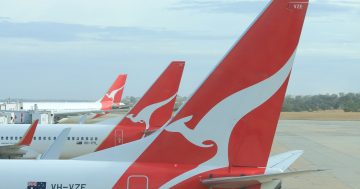
Secretary of the Department of Prime Minister and Cabinet Glyn Davis chairs the APS Secretaries Board. Photo: University of Melbourne.
New guidelines for the Australian Public Service (APS) insist that invitation-only airport lounge memberships must be declared on agency gifts and benefits registers.
But there is no move to ban the acceptance of the exclusive memberships such as the Qantas Chairman’s Lounge, which for the APS is only offered to the highest ranking officials.
The APS’s secretaries board, chaired by Department of Prime Minister and Cabinet Secretary Glyn Davis and co-chaired by APS Commissioner Gordon de Brouwer, met recently to discuss the issue following its controversial airing in recent senate inquiries.
The board’s membership comprises all federal department secretaries, who agreed on the need for a ‘consistent approach to reporting’ of invitation-only airline lounge memberships across the APS.
Qantas offers Chairman’s Lounge membership to secretaries and deputy secretaries of Commonwealth departments, as well as the chairs, chief commissioners and chief executives of key agencies. Senior military officers are also invited.
Virgin’s exclusive Australia Beyond lounges also offer senior public servants free memberships.
The new guidelines order agency heads to create and maintain a register of gifts and benefits they accept – making special mention of lounge memberships.
“In circumstances where agency heads are gifted airline lounge memberships (including those which are invitation-only), these must be recorded in their agency’s gifts and benefits register annually or when circumstances change, such as a new or cancelled membership,” the guidelines state.
“Agencies should comply with their obligations under the Privacy Act 1988 in relation to the publishing of registers.
“This means that consideration should be given to ensuring that the gift or benefit giver is advised that their information may be published on the register.”
According to the new rules, hospitality can be accepted if it is in accordance with the agency head’s official duties.
Any hospitality exceeding the value of $100 (excluding GST) that has been accepted and may give rise to a real or apparent conflict of interest, must be recorded in the register.
“Hospitality may be included as part of another declarable benefit – such as membership of an exclusive airline lounge,” the missive states.
In further guidelines published by the Australian Public Service Commission (APSC), agency bosses have also been urged to restructure management practices to give lower-level employees more authority.
It says agencies should work towards establishing management structures with fewer organisational layers, broader spans of supervision and decision-making at the lowest appropriate level.
“That is, where good decisions can be made safely, and accountability is reasonable for the decision-maker’s classification and position within the agency,” the new guidelines state.
The APSC says the benefits to this style of management structure include:
- senior executives engage directly with employees who have detailed understanding of the issues and employees have a more direct line of sight to their leadership team and benefit from their perspectives and context;
- decisions can be made faster, at the appropriate level, closer to where information is held;
- people have greater opportunity to own their work, promoting employee engagement and empowerment;
- innovation is supported by reducing the number of layers an idea must progress through;
- accountability is enhanced by reducing management duplication and by making individual roles and responsibilities clearer;
- making the best use of our resources and avoiding duplication of effort; and
- with a more direct line for receiving and relaying corporate messaging, communication flows are simpler and employees can gain a deeper understanding of the priorities of the agency.
In further new guidelines, agency heads have been charged with identifying specialists within their workforces and how to attract and retain others.
But these specialists won’t necessarily be paid more.
“A high-performing APS relies on a skilled and confident workforce, including employees with a diverse range of skill sets,” the guidelines state.
“In addition to the fundamental capabilities defined as APS Craft, agencies may require specialist skills.
“The skill sets considered ‘specialist’ can vary across the APS, depending on the nature of each agency’s work.”
Specialists must have capabilities that take time to build, are difficult to replace, and are essential to delivering the enduring work and priorities of the agency.
They are essential to allowing the agency to manage critical risks, and must deliver positive impact to the achievement of the agency’s goals.
“Agencies will determine how best to attract, deploy and retain specialists in their workforce, within the current classification structure,” the guidelines state.
“Specialist roles do not entitle employees to additional salary or allowances. A specialist role can be at any suitable level.”
Original Article published by Chris Johnson on Riotact.









